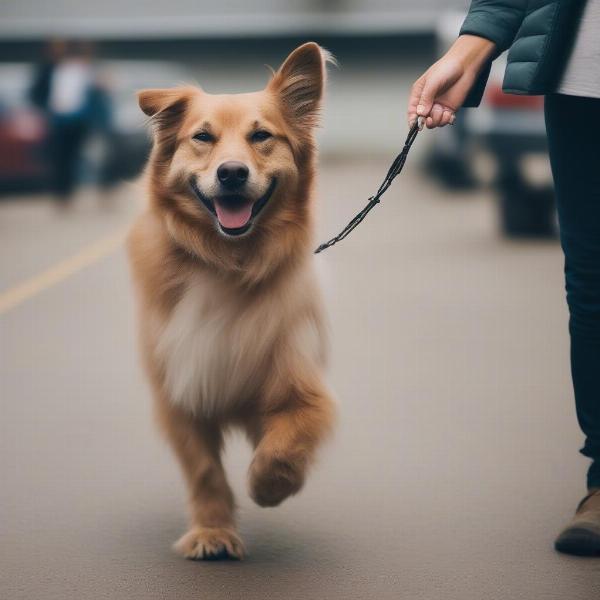Dog training camps offer an immersive experience for your furry friend, focusing on obedience, socialization, and addressing specific behavioral issues. Whether you’re a new dog owner or a seasoned pro, understanding the ins and outs of dog training camps can be invaluable. This guide will explore the benefits, different types, and how to choose the perfect camp for your canine companion.
Understanding the Benefits of Dog Training Camps
Dog training camps provide a structured environment away from the distractions of home, allowing dogs to focus solely on learning. This concentrated training often leads to quicker progress compared to traditional at-home methods. Beyond basic obedience, these camps can help with socialization, confidence building, and addressing behavioral problems like aggression or anxiety. They also provide a much-needed break for busy owners, knowing their dogs are in a safe and stimulating environment.
Types of Dog Training Camps
There’s no one-size-fits-all approach to dog training. Different camps cater to different needs and training philosophies. Some focus on basic obedience, while others specialize in specific disciplines like agility or protection training. Boot camps offer intensive training programs, often involving the owner in the final stages. Board-and-train camps provide 24/7 training and care, while day training camps allow dogs to return home in the evenings. Choosing the right type depends on your dog’s personality, your training goals, and your lifestyle.
Choosing the Perfect Dog Training Camp for Your Dog
Selecting the right dog training camp requires careful consideration. Look for certified trainers with experience in positive reinforcement methods. Observe a training session to assess the trainer’s approach and interaction with the dogs. Check the camp’s facilities for cleanliness, safety, and appropriate space. Ask about the camp’s training philosophy, program structure, and any specific requirements for your dog. Finally, read reviews from other dog owners to get a sense of their experiences.
Preparing Your Dog for Camp
Once you’ve chosen a camp, prepare your dog for a successful experience. Ensure their vaccinations are up-to-date and they’re free of any health issues. Pack familiar items like their bed, toys, and food to ease the transition. Gradually introduce them to the crate if they’re not already crate-trained. Inform the trainers about your dog’s personality, any behavioral quirks, and your training expectations.
What to Expect After Camp
After completing a dog training camp, you’ll likely see a noticeable improvement in your dog’s obedience and behavior. The trainers will provide you with a detailed summary of their progress and guidance on maintaining the training at home. Consistency is key to reinforcing the skills they’ve learned. Continue practicing the commands and exercises regularly, and don’t hesitate to reach out to the trainers for ongoing support.
Conclusion
Dog training camps offer a valuable opportunity to enhance your dog’s obedience, address behavioral issues, and strengthen your bond. By carefully selecting a reputable camp and preparing your dog for the experience, you can set them up for success and enjoy a well-behaved, happy companion for years to come. Remember to research your options, ask questions, and prioritize positive reinforcement methods.
FAQ
- How long does a typical dog training camp last? The duration varies depending on the type of camp and the specific program. It can range from a few days to several weeks.
- Is dog training camp suitable for all breeds? Yes, most dog training camps cater to all breeds and sizes.
- What if my dog has behavioral problems? Many dog training camps specialize in addressing specific behavioral issues like aggression, anxiety, or separation anxiety. It’s essential to discuss your dog’s specific needs with the trainers.
- What should I pack for my dog’s stay at camp? Essential items include your dog’s food, bed, favorite toys, leash, collar, and any medications they require.
- How much does dog training camp cost? The cost varies based on the duration of the program, the type of camp, and the location.
- What is the difference between board-and-train and day training? Board-and-train involves the dog staying at the facility for the duration of the program, while day training allows the dog to return home in the evenings.
- Will my dog miss me while they are at camp? While dogs may experience some initial adjustment, reputable camps prioritize their well-being and provide a stimulating and enriching environment.
 Happy Dog After Training Camp
Happy Dog After Training Camp
Related Articles on ILM Dog
About ILM Dog
ILM Dog is your trusted international resource for all things canine. We provide expert advice on dog breeds, health, training, nutrition, grooming, and much more. From puppy care to senior dog support, we’re here to help you navigate every stage of your dog’s life. We also offer insights into the best products and accessories to enhance your dog’s well-being. At ILM Dog, we’re passionate about empowering dog owners with the knowledge and resources they need to provide the best possible care for their furry companions. Contact us today for personalized guidance on training and behavioral support! Email: [email protected], Phone: +44 20-3965-8624.